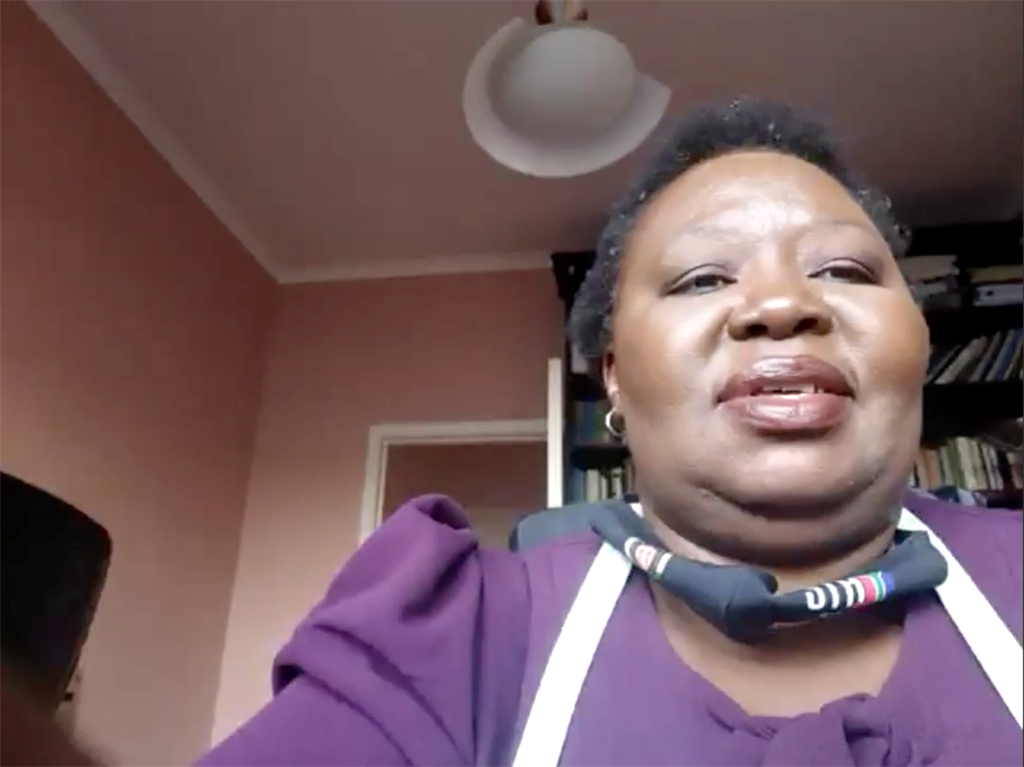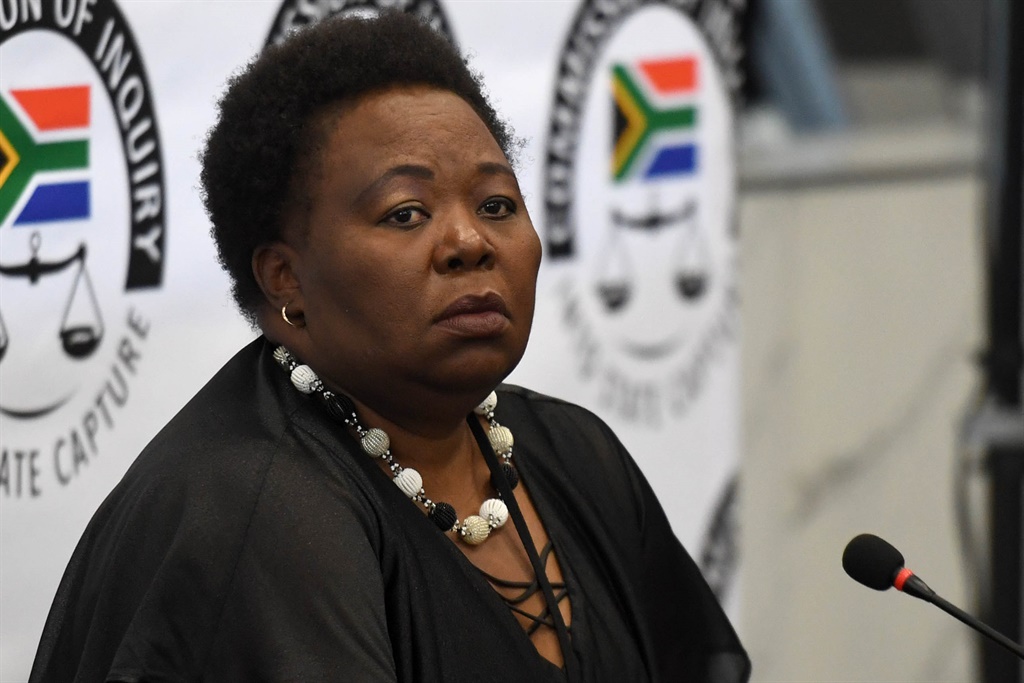Government communications head Phumla Williams says the emotional “torture” she endured as acting GCIS director-general under former communications minister Faith Muthambi was similar to apartheid abuse, adding young people will have to start creating their own opportunities.
After eight years as the acting director-general of the Government Communication Information System (GCIS), Phumla Williams says she is relieved the Cabinet has finally appointed her permanently to the position last week.
Williams, who in 2018 broke down during testimony at the State Capture commission when she shared the emotional abuse she had to endure in the position when individuals attempted to loot state coffers, says the law was finally followed with her appointment.
“I think first and foremost, I’m relieved that we finally did the right thing,” she says in her sunlit office at GCIS’ headquarters in Tshwane, days after her appointment.
Williams, with a South African government face mask hanging around her neck, explains the Public Services Act was not designed for someone to act in a position for so long.
“So I’m really relieved that something has been done to correct the wrong even if it was not me and any other person, but I don’t think it was correct to have the person to act for eight years.”
Phumla Williams
As head of GCIS, the institution responsible for all government communications including spokespeople, Williams will also speak on behalf of the Cabinet – a role carried out by professionals, such as Themba Maseko, in the past.



Williams during her interview with News24 (Screenshot)
After technical difficulties interrupted Williams’ interview with News24 in the morning (“Can someone please call the IT guys?”), she continued her interview at her home in Kensington, Johannesburg, later the afternoon, which she explained had better Wi-Fi.
In line with the state’s call for social distancing, and to avoid any non-essential visits to people in light of Covid-19, the interview took place via a video call.
Compared to her government desk, which was covered in lockdown regulation communication plans, two computer screens, and a miniature South African flag, her study at home was devoid of any clutter, with only reddish-peach painted walls, and a bookshelf filled to the brim. (She is an avid reader, and enjoys a reading good medical thrillers in her spare time).
Williams, an ANC member who was previously detained by the apartheid police in 1989 when she was a member of the party’s military wing uMkhonto weSizwe, says while she’s relieved to be permanently appointed, the real relief came when Faith Muthambi was removed as communications minister in 2018.
“You know, I think for me right now, I’m in a much, much better space. I have so much support from the Minister [in the Presidency Jackson Mthembu] who is currently responsible for GCIS,” she says.
Before she broke down at the state capture inquiry, she testified the “torture” she had endured under Muthambi was the same as the emotional abuse she experienced at the hands of the apartheid police.
“I never thought in this government, people could do such things.”
Phumla Williams
Williams testified she was stripped of her powers because she stood in the way of Muthambi and former GCIS CEO Mzwanele Manyi using GCIS’ roughly R600 million budget to help fund the then-Gupta-owned The New Age newspaper and ANN7 television news channel.
In her testimony, she said Muthambi wanted to “steal at all costs”.
Muthambi, who is now the chairperson of the National Assembly’s Portfolio Committee on Cooperative Governance and Traditional Affairs, described Williams’ testimony as a “personal‚ inappropriate and unjustified” attack on her, and called Williams a “shameful manipulator” and “liar”.
Staring into the distance, Williams paused before explaining that her health became affected when she worked under Muthambi, which prompted her to write a resignation letter in 2016.
She says her eyes started twitching, which she only realised when a friend pointed it out.
“That’s when I realised that I actually am in trouble. Because the last time I had twitches was when I was in Kroonstad prison after I had been sentenced,” Williams says.
“The nightmares also came thereafter which would keep me awake for the better part of the night. And then in the morning, I still have to go to work,” she says, adding if she did not go, a “hostile” Muthambi would not hesitate to replace her.
Williams says she was “battered” and out of desperation, she asked then-president Jacob Zuma “to come to [her] rescue”, but “obviously it didn’t happen”.
The only reason she didn’t complete her resignation, she adds, was because the human resources manager begged her to reconsider, telling her she was still needed in the organisation.



Phumla Williams at the State Capture inquiry in September 2018. (Photo by Gallo Images / Netwerk24 / Deaan Vivier)
Williams says things have “drastically changed” and the “environment was much, much better” as soon as Muthambi left, but she did not want to comment on why the ANC kept Muthambi in a high-profile job in the National Assembly despite the serious allegations against her.
She would also not comment on whether the ANC had sufficiently dealt with corruption post-the state capture era.
“I think … that in this interview, if you allow me, let’s focus it on the public service, and not on the political parties.
“Because that’s where a lot of public servants drop the ball, because then they tend to lose what they are expected to do.”
Williams says she hopes the restructured GCIS, which officially moved back to the Presidency at the beginning of April in line with President Cyril Ramaphosa’s plans to reconfigure the state, would help to educate all South Africans, particularly those in rural areas.
“Sometimes we tend to judge the role of the GCIS in terms of the urban areas and most of the urban areas, they tend to be well served by the mainstream media.”
Williams says she won’t “speak for the minister”, but assumed her appointment took so long – particularly after Ramaphosa became president – because it was difficult to find time in the ministers’ diaries to interview all candidates.
She was finally interviewed for the position in October last year.
“I actually went and I competed [for the position] with everybody else, and I’m very glad [about] that because I think that’s the right thing to do.”
She is also quick to add that she has never used her acting director-general title as an excuse not to deliver, mentioning the division was one of few to receive a clean audit from the Auditor-General over the past few years.
Williams holds a Master’s degree in public administration from the University of South Africa and started working at the GCIS as its chief financial officer in 1998.
Taking a long pause when asked about communications relating to complex lockdown regulations, she says the GCIS has mostly done good work to communicate, often using drones and loud hailers to reach remote communities.
Examples are mentioned of the state’s seemingly contradictory communications over the tobacco sales ban, visiting friends and family, and on the policing of regulations.
Giggling at the mention of the tobacco sales ban, she responds “there is always room to improve”, but adds the regulations are never “ill-intentioned”.
“I think they’ve [the ministers] been brave enough to come back if ever they’ve made a mistake and correct it. They’ve tried to do that,” she says before moving on to the next topic.
Phumla Williams
Fifty-nine-year-old Williams says she joined the ANC after anti-apartheid icon Albertina Sisulu distributed food parcels in Soweto to help feed her, and her two sisters.
She adds her mother, Florence Williams, who was a domestic worker and later a nurse, used to collapse in their home before they started receiving the food parcels.
“We learned that she had not been eating. She would cook, [and] dish up, but because she was stretching the food so that it keeps us going, she would then dish up for us only and she wouldn’t eat.”
Williams says her mother, “a wonderful woman”, opened her eyes to the “abnormal things” happening in South Africa, such as black elders having to stand up for white children at church on Sundays.
“She said: ‘Those kids were meant to sit down on the floor like all of you.'”
As she became more involved in ANC activities, she adds her now-deceased mother started becoming concerned about her safety and arranged for her to leave the country to study. Her mother saw she had a lot of potential and she was “going to go to waste by getting involved in activism”.
But, as soon as she left the country, she was given the option to study or join the struggle – an option only women were given – and chose the latter.
“I wanted to go where everyone was going, to go train.”
Williams says her arrest in 1989, after an Askari (an apartheid government informant) identified her, is “part of her painful history”.
The mother of two, and grandmother of one, says while many things have changed in the 25 years of democracy in South Africa, she has come to learn that respect looks different to black and white cultures, such as calling elders by their names.
“But I don’t allow it. And I insist on my kids that anybody who’s older than them: it’s a sisi, or ubhuti, or umtata,” Phumla Williams says sternly.
Williams says, however, South Africans should continually ask themselves if the country is going in the right direction.
“You know building this nation is going to be an ongoing thing,” she added, before saying “now and then, people will make mistakes”.
Near the end of the interview, Williams, who often works 12-hour days during the lockdown, says while she is concerned about job losses due to Covid-19, she would encourage young people to start businesses instead of waiting for jobs.
The state will have to stimulate the economy, she adds, but people have to step up to the plate, saying her daughter is unemployed.
“It’s OK to go and work for the purposes of gaining the experience, but I think we need to get young people to think outside the box to say: ‘If I’m a videographer in an advertising agency, why should I not work on the road map to start my own agency?'”
“And that’s what I say to my kids to see: work is not going to come to you. You should create the work yourself,” she says before ending the interview to enjoy the wine she bought earlier in the day.

